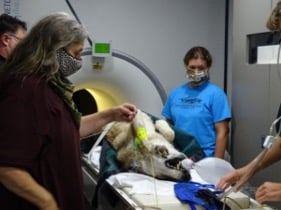Newest pups will be part of programs starting around June 3
Contact information:
Chad Richardson, Communications Director, International Wolf Center
Email: chad@wolf.org
FOR IMMEDIATE RELEASE – The International Wolf Center is adding two pups to its Exhibit Pack in 2022. The pups arrived at the Center on Tuesday, May 10.
The 2022 pups will be visible to the public starting on approximately Friday, June 3.
The Center believes in wolf education, and one method for accomplishing the Center’s mission of advancing survival of wolf populations in the wild is through the use of ambassador wolves.
“These ambassador wolves allow us to teach thousands of people a year about the real behavior of wolves,” said Lori Schmidt, the Center’s wolf curator. “The Exhibit Pack is also a key part of the online programs we offer to schools across the world. These ambassadors are a key part of our aim to teach the world about wolves.”
The Center planned to add pups in 2020, but the Covid-19 pandemic forced the Center to delay those plans for one year. In 2021, the Center planned to add two pups, but was able to obtain just one pup. Adding pups this year was important for the health of the pack, and to allow our yearling wolf Rieka to experience some pup behavior she lacked as a singleton, Schmidt said.
“So often people portray wolves for their predatory behavior and don’t appreciate the intricate pack life and social organization that keeps them together as a social unit,” she said. “As curator, it is my job to maintain a socially cohesive unit of wolves in the exhibit, and we recognize that to do this, new life must be added to the exhibit.”
The International Wolf Center is a non-breeding exhibit, so when pups are added, we coordinate with another professional animal organization. The source is dependent upon reproductive plans within their facility and availability and the Center always acquires captive-born pups.
The 2022 pups were acquired from a USDA regulated facility in Minnesota. They will join three wolves in the Exhibit Pack, including Axel (6), Grayson (6) and Rieka (who turns 1 on May 23).
How do you see the pups?
One way for visitors to see the pups is through an outdoor viewing area adjacent to the wolf yard, where pups will be spending time conditioning to the human component of a public exhibit. These programs are dependent on the weather. They last 15-minutes each and are held throughout the day.
“We will do our best to accommodate everyone, but safety of our guests, our staff and the wolves is paramount,” said the Interpretive Center Director, Krista Woerheide.
Another way to see the 2022 wolf pups is with a one-hour behind the scenes tour. These tours are only available for members of the International Wolf Center. Information about membership is available at wolf.org.
What will their names be?
The International Wolf Center will conduct a pup naming contest beginning in early June and announce the names at a special virtual fundraising event on June 14.
Advance tickets are available for purchase
Everyone who wants to guarantee themselves a chance to see the pups should get an advance admission ticket. To get your tickets, click the Book Now button on the lower right-hand side of the page at wolf.org. For members of the Center, entrance tickets are free. It is recommended that members also book their tickets in advance.
The International Wolf Center advances the survival of wolf populations by teaching about wolves, their relationship to wildlands and the human role in their future. For more information about the International Wolf Center, visit wolf.org.

 FOR IMMEDIATE RELEASE – Once the doors closed at the Ely Bloomenson Community Hospital MRI unit on Sept. 15, a special patient was wheeled into place for a unique MRI. This patient was a wolf.
FOR IMMEDIATE RELEASE – Once the doors closed at the Ely Bloomenson Community Hospital MRI unit on Sept. 15, a special patient was wheeled into place for a unique MRI. This patient was a wolf.